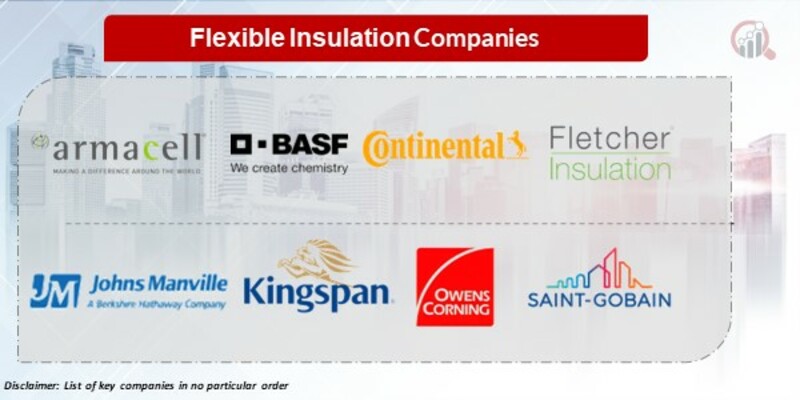Top Industry Leaders in the Flexible Insulation Market

Flexible Insulation Market
The flexible insulation market is where comfort meets competition. Driven by the global pursuit of energy efficiency and a growing appetite for thermal and acoustic insulation, this market is a tightly woven tapestry of innovation, sustainability, and fierce battles for market share. Let's unravel the strategies employed, the factors influencing dominance, and the recent developments keeping this market warm.
Strategies Keeping the Competition Cozy:
-
Product Diversification: Leading players like Armacell and Johns Manville offer a diverse range of flexible insulation materials catering to specific needs. Think aerogel blankets for aerospace applications, elastomeric foams for noise reduction in buildings, and fire-resistant textiles for industrial settings.
-
Sustainability Focus: Eco-conscious consumers are driving demand for sustainable insulation solutions. Companies like Kingspan and Owens Corning are pioneering the use of recycled materials, bio-based polymers, and formaldehyde-free options, tapping into a growing green market.
-
Direct-to-Consumer Channels: Bypassing traditional distributors, brands like Rockwool and Thermaflex are establishing online stores and subscription models, offering personalized recommendations and convenient doorstep delivery.
-
Partnerships and Collaborations: Strategic alliances with construction companies, appliance manufacturers, and energy providers help brands gain access to new customer segments and leverage existing brand loyalty.
-
Technological Advancements: Nano-coatings, self-healing foams, and vacuum insulation panels are emerging trends, with companies like Aspen Aerogels and Dow Chemical introducing novel solutions for superior thermal performance and space optimization.
Key Players:
- Armacell
- BASF SE
- ContiTech AG
- Fletcher Insulation
- Johns Manville
- Kingspan Group
- Owens Corning
- Saint-Gobain
- Superlon
- Thermaxx Jackets
Industry News and Market Trends:
-
Sustainability Push: The increasing demand for eco-friendly solutions is pushing brands to develop biodegradable and formaldehyde-free flexible insulation, with natural wool and hemp gaining traction.
-
Rise of Online Channels: The e-commerce boom is shaping the market, with online retailers offering wider product selections and convenient doorstep delivery, challenging brick-and-mortar stores.
-
Personalization and Customization: Consumers seek tailored solutions, with brands offering product recommendations based on specific applications, building types, and energy efficiency needs.
-
Focus on Niche Markets: The growing popularity of green buildings, energy-efficient appliances, and noise-controlled environments is driving the demand for specialized flexible insulation solutions.
Recent Developments:
August 2023: 3M launches a new line of flexible insulation specifically designed for high-temperature industrial applications.
September 2023: Kingspan unveils a bio-based insulation material made from recycled plastic bottles, catering to the eco-conscious consumer.
October 2023: Owens Corning partners with a leading appliance manufacturer to integrate advanced flexible insulation into their new product line.
November 2023: BASF introduces a fire-resistant and self-healing flexible insulation foam, ideal for building safety applications.
December 2023: Armacell acquires a startup specializing in nano-coated insulation materials, expanding its product portfolio and technological edge.
January 2024: The International Green Building Conference showcases cutting-edge flexible insulation solutions for sustainable construction projects, highlighting the growing importance of this market segment.












